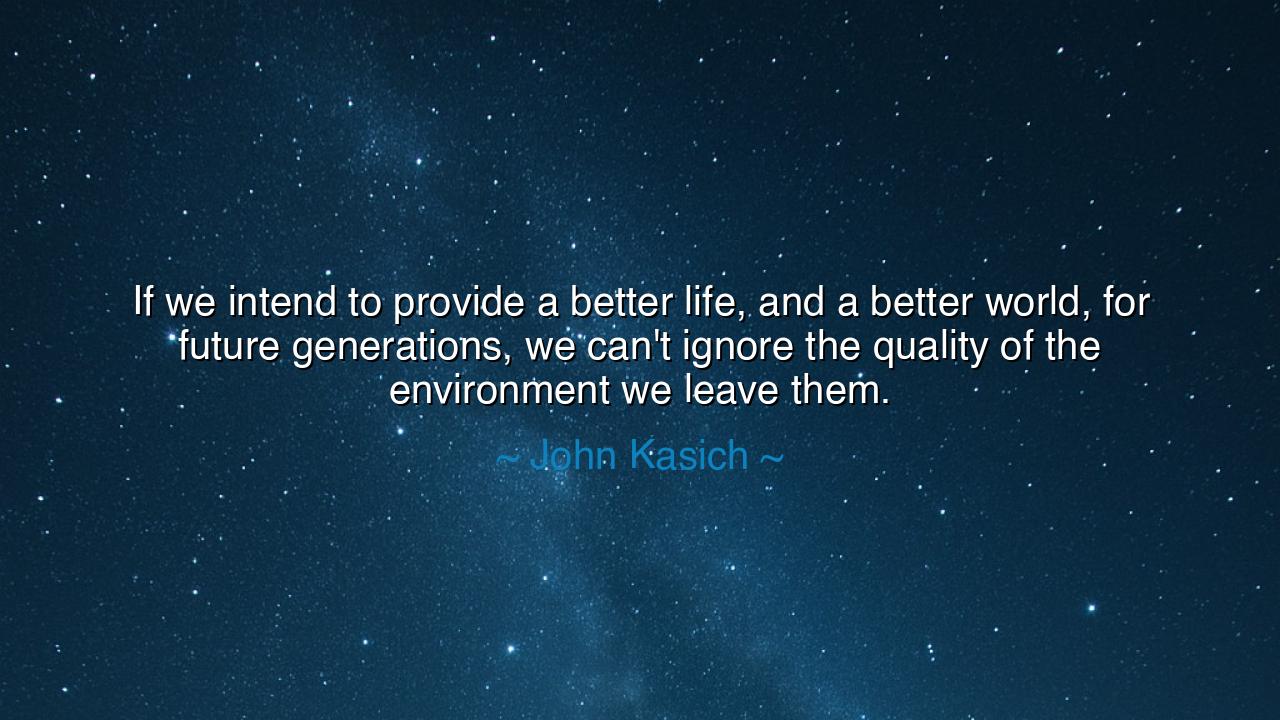
If we intend to provide a better life, and a better world, for
If we intend to provide a better life, and a better world, for future generations, we can't ignore the quality of the environment we leave them.






In the timeless tapestry of human existence, there is a sacred duty that each generation must fulfill: to leave the world better than they found it, not just for themselves, but for the generations that will follow. John Kasich, in his powerful words, "If we intend to provide a better life, and a better world, for future generations, we can't ignore the quality of the environment we leave them," calls us to awaken from the temporary desires of the present and understand that our actions today shape the world of tomorrow. His words reflect an ancient truth, that the prosperity of one generation depends on its wisdom and foresight in caring for the earth and its resources.
In the ancient world, civilizations were often defined by their relationship with the land and the natural resources around them. The Greeks saw the earth as a living being, imbued with a divine spirit—Gaia, the goddess of the earth, represented not just the soil but the interconnectedness of all life. Their philosophical traditions, such as those expressed by Plato, taught that justice was not only about human relations but about the balance between humanity and the earth. The Romans understood that the empire's strength depended on the land's ability to sustain it, and they built aqueducts, roads, and agricultural systems that were designed to serve future generations. Kasich’s quote reflects this ancient wisdom—recognizing that the environment we leave behind is not only a legacy but a measure of the health and sustainability of our future.
Consider the story of Mahatma Gandhi, who, though not a scientist or an environmentalist, understood deeply that true progress is rooted in harmony with the earth. Gandhi’s philosophy of non-violence extended to all aspects of life, including the way we treat the land. He believed in living simply, in harmony with nature, and in preserving the earth’s resources for the good of future generations. He championed sustainability and self-reliance at a time when India was grappling with colonial exploitation and environmental degradation. His teachings remind us that environmental stewardship is not merely about policy—it is about a deep, spiritual responsibility to the land and those who will walk upon it after us.
Similarly, Thomas Jefferson, the third president of the United States, understood the importance of land for future generations. As the principal author of the Declaration of Independence, Jefferson believed in the inalienable right to life, liberty, and the pursuit of happiness—rights that could only be sustained through careful management of the environment. Jefferson’s own experiments with agriculture and his designs for sustainable farming practices spoke to his understanding that wealth and freedom are inextricably linked to the health of the land. His vision was one where future generations could not only inherit land but also the tools and knowledge to care for it, to continue living in harmony with nature.
Kasich’s call to action is not just about preserving nature, but about recognizing the interconnectedness of all things. Just as the ancients understood that the land and the people were bound together in a delicate balance, we too must recognize that a world divorced from nature is one that ultimately self-destructs. The industrial revolution, though it brought progress and prosperity, also led to overconsumption and environmental destruction, a lesson we must learn from. The ravaging of our forests, the poisoning of our waters, and the pollution of our skies are not just signs of greed and negligence; they are warnings of what happens when we ignore the quality of the environment we pass on to those who will inherit our legacy.
The lesson from Kasich’s words is not merely about preserving the earth, but about recognizing the sacred duty we have to those who will follow us. Just as the ancients built their empires with the intention of providing for future generations, we must ensure that our actions today are guided by a long-term vision—one that prioritizes sustainability and the well-being of the earth and all its inhabitants. This is not a task for the future, but one that must begin now, with the understanding that the decisions we make today will define the world of tomorrow. Our economy, our laws, and our borders must be built with wisdom, guided by the knowledge that the earth is not a resource to be exploited, but a gift to be preserved.
As we reflect on Kasich’s wisdom, let us remember that the true measure of our civilization is not in the riches we amass or the technologies we create, but in how we care for the world that sustains us. Let us be like the great leaders of the past who understood that the legacy we leave is not just in buildings or monuments, but in the health of the earth and the prosperity of future generations. Let us act with the knowledge that our choices today are the foundation of the world that tomorrow will inherit. In doing so, we will not only secure our own legacy, but we will honor the sacred trust of those who will come after us.






AAdministratorAdministrator
Welcome, honored guests. Please leave a comment, we will respond soon